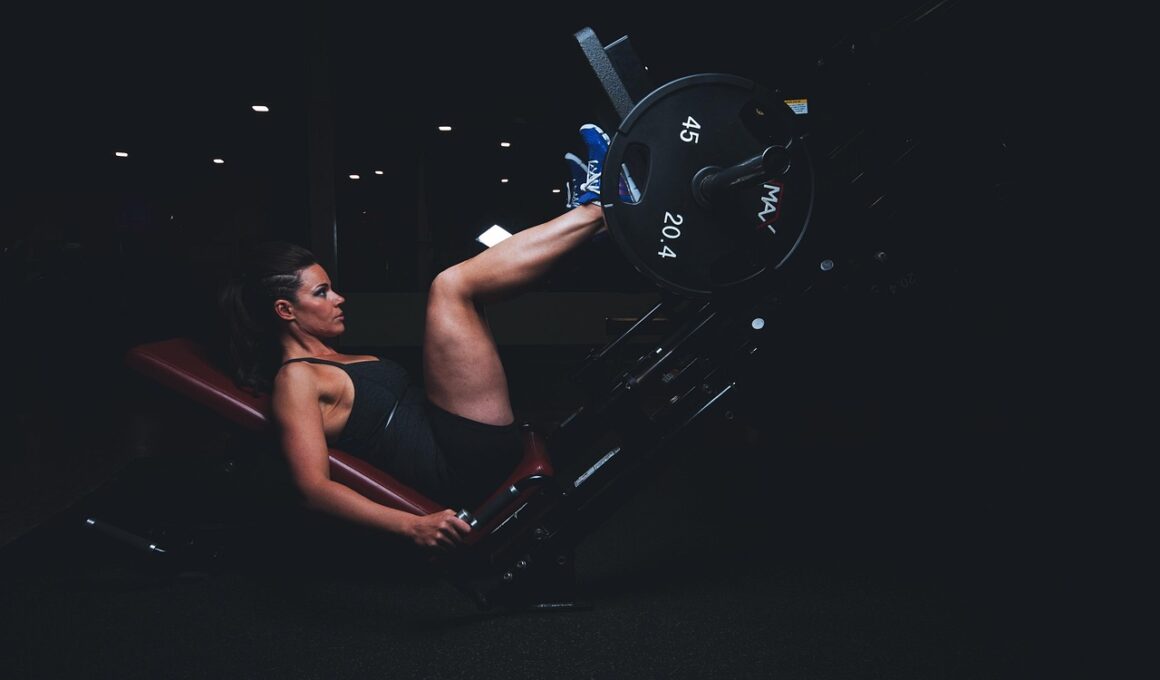The Impact of Caffeine on Women’s Pre-Workout Energy
Caffeine is a well-regarded stimulant that many women include in their pre-workout nutrition. Women, just like men, can benefit significantly from caffeine’s performance-enhancing properties. Consuming caffeine before workouts can lead to improved endurance and reduced fatigue, particularly in higher intensity workouts. Research indicates that caffeine can enhance both aerobic and anaerobic performance for women. The effectiveness of caffeine may vary based on individual tolerance levels and the amount consumed. It is crucial for women to assess their own caffeine sensitivity when integrating it into their routine. A common recommendation is to consume caffeine 30 to 60 minutes prior to exercise. This timing allows the body to absorb caffeine and maximize its benefits during the workout. Women, especially those focusing on strength training or high-intensity workouts, may find that caffeine enhances their power output significantly. It’s important to stress moderation and ensure that overall hydration levels remain adequate. Lastly, consulting with a nutritionist can provide personalized caffeine strategies suited for individual fitness and health goals.
Understanding how caffeine affects women differently due to hormonal variations is essential. Hormonal fluctuations during the menstrual cycle can influence how caffeine is metabolized and its effectiveness. For instance, studies suggest that estrogen may hinder caffeine’s metabolic effects during certain phases of the cycle. As a result, some women may experience greater or lesser performance enhancements depending on their cycle phase. Notably, this variation emphasizes the need for women to track their workouts relative to their menstrual cycle. Women may also experience different side effects from caffeine, such as anxiety or jitteriness—especially if they consume it in high quantities. Moreover, hydration is paramount; caffeine is technically a diuretic. These factors must be considered when determining optimal caffeine intake for workouts. Beyond the physiological effects, the psychological effect of caffeine can also play a role. Many athletes report feeling less fatigued and more motivated to train after caffeine consumption. Thus, understanding personal reactions to caffeine is critical for maximizing workout effectiveness while ensuring mental focus. Nutritional guidance can support this understanding, helping women navigate caffeine in their pre-workout nutrition.
Choosing the Right Caffeine Source
When considering caffeine sources for pre-workout nutrition, women have various options to choose from, each with specific pros and cons. Coffee, tea, energy drinks, and supplements are widely used, but they also vary in caffeine content. For example, an 8-ounce cup of brewed coffee typically contains around 95 mg of caffeine, while energy drinks might have varying amounts, often more than what coffee contains. Supplements may provide a concentrated dose, often marketed specifically for athletic performance. However, caution is essential, as many pre-workout supplements also include other stimulants and ingredients. Not all forms of caffeine will work equally for every individual; personal preference and digestive tolerance must guide choices. While liquid forms like coffee can be absorbed quickly, powdered forms allow for easy measurement. Additionally, the consumption timing of caffeine is essential. Drinking coffee too close to workout time might lead to gastrointestinal distress, while supplements can be strategically taken based on their formula. By experimenting with different sources and timings, women can discover what works best for their unique fitness journeys.
While caffeine undoubtedly has benefits, it’s essential to monitor its intake closely. Excessive caffeine consumption can lead to negative side effects such as increased heart rate, anxiety, and insomnia. Women must be cautious about how caffeine interacts with any medications or supplements they may take. Establishing a moderate caffeine intake typically varies, with general guidelines suggesting about 3-5 mg per kg of body weight. Athletes might aim for lower doses around 2-3 mg per kg to evaluate tolerance first. Notably, hydration continues to be vital when consuming caffeinated beverages; for every caffeine source, women should ensure they consume adequate water. Additionally, combining caffeine with carbohydrates pre-workout may maximize performance benefits even further. Alternatives to caffeinated products, like herbal teas or beverages contain other compounds that may enhance endurance, are also worth exploring. Successful workout strategies for women should tailor caffeine intake according to their needs, goals, and exercise schedules. Keeping a performance log can help women identify how various pre-workout options affect their training outcomes over time.
Potential Risks and Considerations
No discussion on caffeine would be complete without acknowledging potential risks associated with its consumption. While moderate caffeine intake is typically safe, higher doses can lead to adverse effects like increased heart rate, anxiety, and gastrointestinal discomfort. These side effects can be particularly pronounced among women who are not regular caffeine consumers. Furthermore, those with medical conditions or at risk for hypertension should consult healthcare professionals before integrating caffeine into their pre-workout routine. Another key consideration is individual sensitivity; various factors, including genetics and hormonal status, can dictate how caffeine affects women differently. Testing various amounts to find the right balance is critical, as reactions to caffeine vary widely. It is also essential to consider the timing of caffeine consumption to avoid insomnia and disrupted sleep patterns. Establishing lower dosages which allow for positive effects can also safeguard against jitters and anxiety during workouts. Women might seek a balance of caffeine enjoyment while prioritizing overall well-being during their training regimen. Engaging with a nutritionist for in-depth advice can help navigate these concerns responsibly.
Lastly, women should also focus on a holistic approach toward their pre-workout nutrition. While caffeine serves as a powerful tool for enhancing energy levels, it should not replace the fundamental components of a balanced diet. A nutritious pre-workout meal rich in carbohydrates, proteins, and healthy fats is vital for fueling workouts effectively. The energy provided by whole foods cannot be underrated; focusing solely on caffeine can lead to imbalances in nutrient intake. Often, pairing caffeine with a balanced meal or snack can yield optimal results, synergizing the quick energy boost with sustainable fuel sources. Incorporating complex carbohydrates like whole grains or fruits ensures that energy levels remain steady throughout the entire workout. Adding quality protein also aids in muscle preservation during physical exertion. Moreover, healthy fats help in the absorption of fat-soluble vitamins. Regularly reviewing pre-workout strategies and making dietary adjustments accordingly can ensure that women maintain high energy levels. Women, in addition to caffeine, should prioritize overall nutrition for maximum fitness benefits and enhanced performance.
Conclusion
In conclusion, caffeine plays a significant role in women’s pre-workout nutrition, contributing to enhanced energy levels and performance. Understanding its effects, appropriate sources, timing, and possible side effects allows women to make informed choices about caffeine consumption. By incorporating caffeine in moderation, women can experience its benefits without falling prey to adverse effects. Listening to one’s body is key; each woman’s response to caffeine can differ widely, determined largely by individual factors. Combining caffeine with strategic nutrition can optimize its benefits further and pave the way for successful workouts. Additionally, ensuring hydration, managing timing, and balancing it with whole foods will create an effective pre-workout strategy. Ultimately, prioritizing individualized approaches while embracing caffeine’s benefits can lead to improved fitness outcomes. Maintaining a holistic perspective on nutrition will ensure women can reach their athletic goals without compromising health. Engaging healthcare professionals or nutritionists can provide personalized guidance to enhance pre-workout practices further. Caffeine will continue to be an ally for motivated women who seek to elevate their training sessions while ensuring they stay strong, focused, and energized.
Caffeine is a well-regarded stimulant that many women include in their pre-workout nutrition. Women, just like men, can benefit significantly from caffeine’s performance-enhancing properties. Consuming caffeine before workouts can lead to improved endurance and reduced fatigue, particularly in higher intensity workouts. Research indicates that caffeine can enhance both aerobic and anaerobic performance for women. The effectiveness of caffeine may vary based on individual tolerance levels and the amount consumed. It is crucial for women to assess their own caffeine sensitivity when integrating it into their routine. A common recommendation is to consume caffeine 30 to 60 minutes prior to exercise. This timing allows the body to absorb caffeine and maximize its benefits during the workout. Women, especially those focusing on strength training or high-intensity workouts, may find that caffeine enhances their power output significantly. It’s important to stress moderation and ensure that overall hydration levels remain adequate. Lastly, consulting with a nutritionist can provide personalized caffeine strategies suited for individual fitness and health goals.


